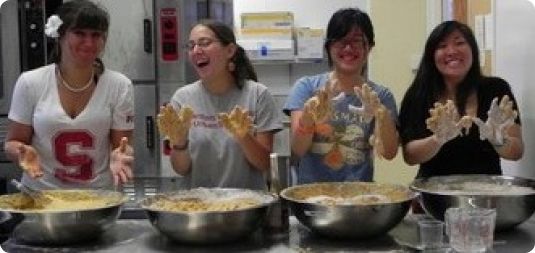Challah for Hunger = Bread for Life

Thanks to a group of concerned Stanford University students, members of their campus community enjoyed fresh challah—a braided bread eaten on the Jewish Sabbath and holidays—while helping communities in sub-Saharan Africa beat the scourge of malaria.
Challah for Hunger, a nonprofit with campus chapters nationwide, bakes and sells challah to help raise awareness and funds to address a range of social justice issues. Last fall, the organization’s Stanford chapter designated proceeds from one of their weekly sales to NetsforLife®, Episcopal Relief & Development’s program partnership to fight malaria—a deadly disease spread by mosquitoes.
Ttwo years ago, seniors Helen Helfand and Eva Orbuch co-founded the Stanford chapter under the Jewish Students Association (JSA). Every Thursday, volunteers gather at the campus Hillel kitchen to bake 160 loaves in flavors from plain to exotic (including pumpkin, olive rosemary and chocolate chip—among the most popular). They sell the challah that evening and the following day. The JSA subsidizes the cost of ingredients, enabling the chapter to donate all the proceeds to their causes.
Helen, who is the social outreach chair for JSA, explained that different campus organizations usually co-sponsor the weekly sales. In return for providing volunteers for each of the baking and selling shifts, co-sponsors get to designate a humanitarian cause to receive half of the week’s profits. “Last quarter the interfaith organization FAITH (Faiths Acting in Togetherness and Hope) chose NetsforLife® as a beneficiary,” Helen said.
According to Heidi Thorsen, a co-president of Stanford FAITH, the group was seeking a beneficiary organization that would reflect its interests in interfaith collaboration and malaria prevention. NetsforLife® was recommended by FAITH’s advisor, the Rev. Joanne Sanders, Associate Dean for Religious Life at Stanford and an advisory committee member for the NetsforLife® Inspiration Fund Campaign. The Inspiration Fund is a national campaign to increase awareness of NetsforLife® among local Episcopal communities and the public, and to raise funds to help the program partnership distribute 7 million mosquito nets over the next three years.
Raising awareness is also what motivates Eva and Helen, who started Stanford Challah for Hunger out of a desire to provide a concrete way for Jewish students to get involved in social justice. As Eva put it, “We are not just a bake sale…We have opportunities for political advocacy at the selling table every week, and we’re hoping to ramp up this aspect of the organization.” So while enjoying the fun of making, selling and eating the savory loaves, volunteers and customers also learned about how the proceeds will help communities combat malaria and save lives.
“We’re grateful for the meaningful and creative ways that groups like Challah for Hunger are supporting NetsforLife® in the fight against malaria,” stated Joy Shigaki, Director of the NetsforLife® Inspiration Fund and Church Campaigns. “On behalf of the Inspiration Fund and the people we serve, we welcome everyone to join us in this important work.”


